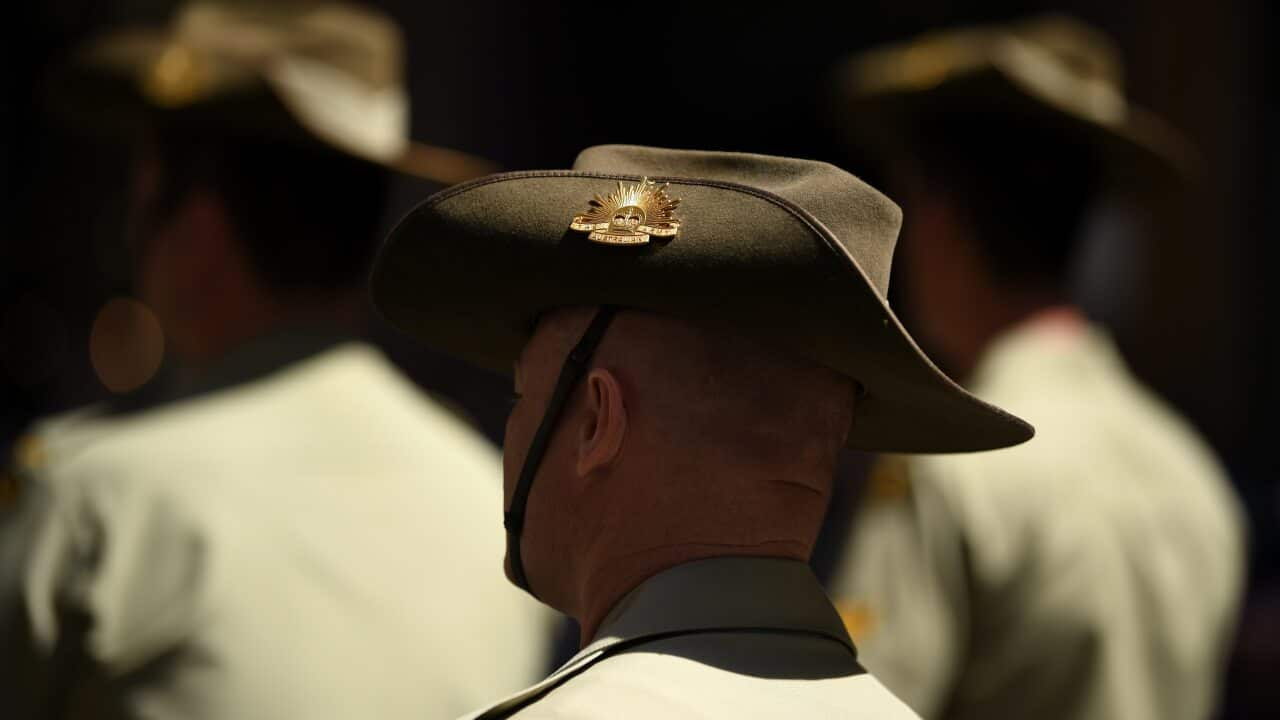Prime Minister Scott Morrison has announced the creation of a new permanent independent commissioner into veteran suicides, who will investigate the deaths of serving and ex-service men and women.
The National Commissioner for Defence and Suicide Prevention will review the deaths of more than 400 defence personnel who have taken their own lives since 2001, and make recommendations to improve mental health and wellbeing. Aboriginal and Torres Strait Islander Veterans and Services Association (ATSIVSA) president Gary Oakley said this is a problem that is in desperate need for a solution, but he is not convinced a national commissioner is the right way to go.
Aboriginal and Torres Strait Islander Veterans and Services Association (ATSIVSA) president Gary Oakley said this is a problem that is in desperate need for a solution, but he is not convinced a national commissioner is the right way to go.

Army personnel during a Remembrance Day Service in Sydney, 2019. Source: AAP
"It's about time people started to talk about it," he told NITV News.
"We've had 100 years of military service here and every war we've ever been in someone has committed suicide after it.
"It's about time - it's taken us 100 years to sort this out but we've got to do it properly, we've got to do it properly. There are a lot of things to look at."
The suicide rate for ex-servicemen is 18 per cent higher than among other Australian men and ex-servicewomen are twice as likely to take their own lives as other women in Australia. Mr Oakley said while statistics specifically about Aboriginal and Torres Strait Islander veterans are not known, Indigenous ex-servicemen and women face different barriers to other veterans when they return from service.
Mr Oakley said while statistics specifically about Aboriginal and Torres Strait Islander veterans are not known, Indigenous ex-servicemen and women face different barriers to other veterans when they return from service.

ATSIVSA president Gary Oakley. Source: Supplied
"Mob once they've been in the service they become two mobs," he said.
"They join this defence family and they basically join a clan group, which is army, navy, airforce, whatever. They step out of the defence force kind of in two worlds and they have to go back to their old, 'other' world.
"You're cut off from a certain type of life and you don't get that chance to transition back. That's the problem.
"When people come and ask you 'oh what problems are you having because you've left the defence force' and you say 'you're a public servant, I can't talk to you, you don't understand how I feel how I feel, what I've done, who I've worked with, how I feel to my mates and how I feel to my community on top of that.
"It's a hard problem because it's got a lot of nuances."
Mr Oakley said he hopes these nuances, and the cultural diversity of the defence force is not looked over in the work of the new commissioner.
"We join the military for different reasons," Mr Oakley said.
"We think differently, our family ties are different, the way we do business is different. We can't just be lumped in as one group of people as all ex-defence.
"You've got to actually look at the cultural side of this, and not just Indigenous Australians. The Australian defence force today is a multicultural defence force."
$40 million has been set aside by the government to set up the office of the commissioner, who will deliver an annual report to parliament, assessing suicide risk factors. The government will also establish a veteran family advocate alongside the commissioner, who will communicate with and represent veterans and their families.
The government will also establish a veteran family advocate alongside the commissioner, who will communicate with and represent veterans and their families.

A flag bearer salutes during the Anzac Day Dawn Service in Sydney. Source: AAP
Mr Oakley said he hopes to see tangible results.
"I think it's a good thing but I'd personally like to see defence looking at how people transition out of the defence force and how they can help people once they transition out of defence," he said.
"We need to be able to set up these things so that ex-military personnel can join and talk to their mates and talk things over.
"I think before we go to do some of this stuff we've really got to look at the veterans themselves."


